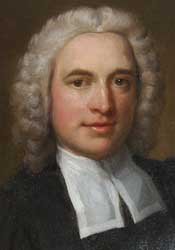Thoughts for the Day
Monday, 24th May 2021: Charles Wesley
Righteous Matthew 25 Son of Man Preacher
Reading : Verses from Mark, Chapter 10

'When the Son of Man comes in his glory.....he will separate people one from another as a shepherd separates the sheep from the goats, and he will put the sheep at his right hand and the goats at the left. Then the the king will say to those at his right hand, "Come, you that are blessed by my Father, inherit the kingdom prepared for you from the foundation of the world, for I was hungry and you gave me food. I was thirsty and you gave me something to drink. I was a stranger and you welcomed me. I was naked and you gave me clothing. I was sick and you took care of me. I was in prison and you visited me."
The the righteous will answer him, "Lord, when was it that we saw you hungry and gave you food, or thirsty and gave you something to drink? And when was it that we saw you a stranger and welcomed you, or naked and gave you clothing? And when was it that we saw you sick or in prison and visited you?" And the king will answer them, "Truly I tell you, just as you did it to one of the least of these who are members of my family, you did it to me." '
(Church in Wales Lectionary, New Revised Standard Version)
Thoughts
Today we remember Charles Wesley. I can only touch on his immense influence on the Church here. He is best known for his hymns, of which he wrote some 6,500. They are hymns that many of us know, and which are much loved. Hymns like:
- And can it be;
- Come thou long expected Jesus;
- Hail the day that sees him rise;
- Hark the herald angels sing;
- Jesu, lover of my soul;
- Lo, he comes with clouds descending;
- Love divine all love's excelling;
- O for a thousand tongues to sing;
- Rejoice, the Lord is King;
- Ye servants of God.
Charles was born in 1707 in the Rectory of Epworth in Lincolnshire. He was the 18th child of the Vicar, the Revd Samuel and Mrs Susannah Wesley, though only ten of the children survived. His mother had an enormous influence upon him, instilling in him the need to be organised in his devotions and study. He and his brother John were to apply this to life after university and ordination. Charles Wesley was to have an influence on the great evangelist Charles Whitefield.
When I was ordained a Deacon I was part of an ecumenical Church in Gloucester. The Methodist Minister gave me two books of Whitefield's sermons when I was ordained, and these, as well as singing the glorious hymns each week led to me to have an enormous respect for Methodist's emphasis on music, on preaching, and on study.
As the new 'Methodicals', (that is, Methodists), found themselves edged out of churches largely because of their desire to take the word of God to people wherever they were, even though they were encouraged to attend their parish church, opposition grew. The leaders took to preaching in the countryside, and Charles wrote many of his hymns on horseback as they travelled the country. But Charles struggled with John's desire to separate from the Church of England. Although this subsequently happened, the two denominations have worked hard to get back together during my life-time, and Charles is buried in Marylebone Parish Church as he considered himself a member of the Church of England all his life.
Prayer
Lord Jesus,
may we learn
from the example of Charles Wesley,
to apply our faith
and put it into practice in our life.
May we continue to study Your word
in our bible and through the words of hymns,
and take them to heart.
Amen.
If you would like to learn more about Charles Wesley, you could look up the following site:
If you would like to listen to a couple of Wesley's hymns, and perhaps sing along, see the two examples below:
- O for a thousand tongues to sing, set to 'Lyngham' the usually sung by members of the Methodists church: https://m.youtube.com/watch?v=X-dEfvz6Vms
- Jesu, lover of my soul, set to a tune not known by me, but which really emphasises the wonderful poetry. It is also worth noting that it is being sung at the Annual Conference of the Methodist Church: https://m.youtube.com/watch?v=VyE8aJHO57s